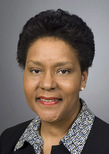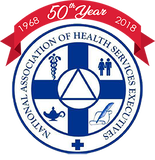|
1. Please, tell me a little about yourself? What is your story?
I grew up in New Jersey and went to grammar school and high school there. For college, I attended Hampton Institute in Virginia and majored in Psychology and Spanish. I was preparing to take the MCAT for medical school admission. However, when I attended a number of information sessions for medical school, I was introduced to the field of healthcare management. I decided to pursue health management because it allowed me to marry my interests in science, business, and management. I went to graduate school at the University of Pittsburgh in Health Policy and Management. At the time, the program was a 3-year program in the School of Public Health, and so I took the typical epidemiology and statistics as well as accounting, insurance, legal, and management classes. Between the two-didactic years of study, I completed an internship at the University of Pittsburgh Medical Center Falk Clinic in ambulatory care – and realized that it was the field I wanted to pursue as a career. So, I did my fellowship in the 3rd year of my graduate program at Rush University Medical Center in Chicago. Rush was one of the first medical center that transitioned the clinics to private practice, so that patients could be better served. During my fellowship at Rush, I wrote my master’s thesis on managed care marketing using Anchor HMO, Michael Reese Health Plan, and CNA IPA as my data sources. I have always been interested in looking at access points to healthcare delivery and once I finished my master’s, I remained at Rush for six-years to become Assistant Vice President for Ambulatory Care. I departed Rush and went on to the American Hospital Association as its director of Ambulatory Care, Health Promotion, and Women’s and Children’s Health and established the Society for Ambulatory Care Professionals. I did a lot of work nationally and internationally, looking at ambulatory care from payment reform, access, cost, and quality. After six-years, I wanted to return to the provider side so accepted a Vice-President role at Lake Hospital Systems, an affiliate of University Hospitals of Cleveland. I got the opportunity to work for U.S. Healthcare in Philadelphia to head its Medicare, Medicaid, and Individual Products Division as a Vice-President so I gladly returned to my native East Coast. The job required travel between Connecticut, New York, Washington D.C, Maryland, and Virginia for contract negotiations. After working eight years in the insurance industry, I decided to pursue my doctorate. I wanted to better understand what I was seeing in the insurance marketplace through a rigorous graduate program at the University of Illinois-Chicago. I pulled out my old University of Pittsburgh graduate paper on HMOs to examine the insurance marketplace and the competition between for-profit and non-profit insurance companies and how ownership status affected the provision of Medicare, Medicaid and Individual products. I defended my dissertation and was offered a faculty position at Rush University – right where I had started my career. So, I returned to Rush and started teaching three courses at the master’s level. I managed the doctoral program at Rush and then became Director of Student Development. I also served on a hospital, alumni, association, and church boards to give back to the broader community. 2. What is something that most people do not know about you? I am fairly transparent. I like what I do and I take positions on issues. I don’t think there is anything that people do not know about me, other than I get very impatient when progress is not being made and goals are not being established. I am very time conscious and I don’t like being unproductive. Though I may not appear impatient, I do want things to be managed efficiently. 3. When have you been most satisfied in your life? I am a very optimistic person and I am usually satisfied with most things, because if I was not, I wouldn’t be doing what I am doing - I would make a change. So, I have been satisfied with my life continuously. It’s difficult for me to pinpoint a particular period or an instance when I was most satisfied, but if I have to, then I am most satisfied when I am contributing meaningfully both professionally and personally. So quite frankly, I am very satisfied with my life. 4. Most people have a list of things they like to do, but what are the things that you do not like to do? Things I don’t like….I find it difficult to relax, I constantly need to be doing something stimulating, and learning new things. So the thing I don’t like to do would be when I am doing nothing, when I am not being productive, when I am not contributing or being intellectually stimulated. 5. Could you please tell me about a specific accomplishment that you consider to be the most significant in your career? I would say working with the National Association Health Service Executives (NAHSE). One thing I am always interested in is that organizations have their history, and that the history is documented. I joined NAHSE when I was in graduate school, so it’s been a 36 year relationship. There is a tendency for people of color to talk a lot about things, but we don’t commit it to writing which results in organizations losing their history. I think the thing I am most proud of is that I captured the 40 years of the organization’s history through a committee process. It took 18-months to complete the book with pictures of the presidents and officers and milestones, along with organizational triumphs. It was a very elaborate process and the book was published and presented at the organization’s 40th year anniversary in Atlanta, Georgia. We had John Lewis, Georgia Congressman and Civil Rights Activist as the keynote speaker at the book unveiling. It meant a great deal to have Congressman Lewis there at this occasion. 6. Please tell me about a time when things didn't go the way you wanted-- like a promotion you wanted and didn't get, or a project that didn't turn out how you had hoped. Probably the one I most remember was when I was younger. I had applied for a CEO role and went through all the rounds of interviews, but did not get the position. A colleague of mine got the role. Initially, I was disappointed but I handled it maturely and congratulated the candidate who was appointed. Eventually, I realized that it was a management position I didn’t want. I was more impressed with the title and salary, at that time. This incident made me realize that I should not go after anything that I truly didn’t want, or something that I want for material reasons or material possessions. I need to go after something where I have fire in my belly. This was a lesson for me and it worked out well, because I eventually got the job I really wanted at the American Hospital Association. So sometimes the wait is worth what you get. |
7. We're constantly trying to making healthcare better, faster, smarter or less expensive. We leverage technology or improve processes. In other words, we strive to do more - with less. Tell me about a recent project or problem that you made better, faster, smarter, more efficient, or less expensive.
I am currently working in the academic world and am the Chair of the Admissions Committee for the graduate program at Rush. The admissions’ process was taking 16 to 24 weeks to interview and recruit a class of 26. The timeframe is long and time-consuming. I’ve been working with another Ph.D. faculty in order to develop a process that will take 4-5 weeks. I am pleased with the revised schedule and have simulated it and now we are getting ready to put it in practice for the fall. So that is one project, I am really pleased with - using the expertise of a management engineer, Shital Shah, to make the process efficient so time is not being wasted. 8. Who is your role model and why? Professionally speaking, Dr. Wayne Lerner. He was the person I worked for when I first came to Rush, 36 years ago. We maintained a 36 year relationship, and I have always admired him. We co-taught a class together. I served as his board chair at the hospital where he was the CEO. I admire his perspective on people and issues. He never loses his perspective and always keeps his composure. He is always there for me and he taught me how to think strategically. He is an exquisite writer with a good family and good values. He knows how to pull-my-chain and keep me accountable when I get evasive about things. In my personal life, my father William Howard, is my role model. My father is deceased, but I admired his work ethic, his values, his organizational skills, and his financial management skills. He put his family first. He had a successful career in management, but was always very prudent. I admired the way he conducted his personal affairs. After my mother died, he made a commitment that his children would always come first and he committed that he would never re-marry. He wanted to ensure that his children were always provided for and provided for well. His admonishment was that we had to make him proud and live up to our mother’s standards. He left a legacy of integrity. 9. What is the quality you most admire in others? Integrity - that a person commits to something and then stands by his /her commitments. That they are honest with their successes and failures and that they never compromise their values while working to achieve their goals. 10. What has surprised you most about working in Healthcare? The thing that surprises me most is that we fail to look out for the greater good. And my biggest disappointment is there is a tendency for people to want bigger, better, more and not look out for the vulnerable and dispossessed. 11. If we're sitting here a year from now, celebrating what a great year it's been for you, what did we achieve? I would say my work as an Associate Professor with published articles and a new grant over a hundred thousand dollars. I am working to expand initiatives, I have been working on with my sister Joanne and that I continue to like and appreciate the person I have become. 12. Finally, any word of advice / wisdom to fellow members and colleagues? My only advice would be that people should pursue their passion. At my age, I can say this - you need to have experience to gain a perspective in life. The thing I would like to tell people is that they need to follow their values and what they like to do. They should do what they enjoy doing and fulfillment and all the economic advantages will follow. |
N.A.H.S.E. Chicago Midwest Chapter
© 2014-2024 National Association of Health Services Executives, NAHSE - Chicago Midwest Chapter. All rights reserved.



